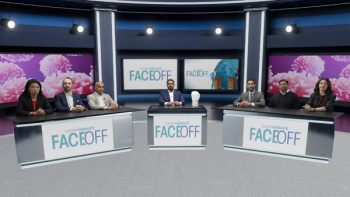Team Blue vs Team Purple: Optimizing Frontline Treatment Strategies for the Management of EGFRm NSCLC

Experts partake in a dynamic, debate-style educational event where teams present and challenge current frontline treatment strategies for EGFR-mutant non–small cell lung cancer (NSCLC), focusing on the promise and practical challenges of combination therapy involving a bispecific antibody and third-generation EGFR tyrosine kinase inhibitor (TKI).

Experts have a compelling debate on first-line treatment for EGFR-mutated non–small cell lung cancer (NSCLC), weighing the robust survival and central nervous system (CNS) benefits of osimertinib plus chemotherapy against the promise of novel targeted strategies that aim to prevent resistance and push the boundaries of precision oncology.

Experts have a nuanced debate on frontline treatment for EGFR-mutant non–small cell lung cancer (NSCLC) with brain metastases, contrasting the central nervous system (CNS) efficacy and clinical familiarity of chemotherapy-based combinations with the precision and potential durability of newer targeted regimens, ultimately emphasizing individualized care and critical appraisal of trial data.

Experts discuss the trade-offs between long-term efficacy and real-world tolerability in EGFR-mutant non–small cell lung cancer (NSCLC) treatment, debating innovative targeted regimens vs familiar chemotherapy-based approaches and emphasizing the importance of personalized care, supportive infrastructure, and shared decision-making in optimizing outcomes.

Experts discuss the complexities and controversies in sequencing therapies beyond first-line treatment for EGFR-mutant lung cancer, balancing up-front regimen efficacy with preserving later treatment options while navigating evolving evidence, emerging therapies, and real-world challenges such as access and individualized patient care.

Experts discuss a complex case of a middle-aged woman with high-risk EGFR-mutant lung cancer and brain metastases, highlighting the balance between aggressive combination therapies and patient-centered shared decision-making amid clinical, logistical, and psychosocial challenges.

Experts discuss the treatment dilemma for a 72-year-old man with high-risk, metastatic EGFR-mutant lung cancer, weighing the benefits of aggressive combination therapy against monotherapy while emphasizing patient preferences, comorbidities, and quality-of-life considerations in individualized care.


